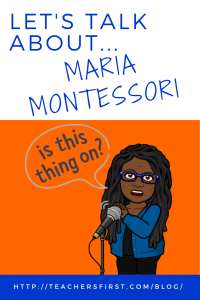This school year, the TeachersFirst team has explored the notion of women as change-makers throughout history. In our quest to equip educators with enriching resources, we’re adding resource materials and lesson ideas that share the work of some of these leaders. Today, we’ll look at the inspiring journey of Maria Montessori—a true pioneer in the field of education.
Montessori was a trailblazer from the onset of her career, a visionary thinker with unwavering passion and commitment to creating positive change. In an era when societal norms restricted women from pursuing medicine, Montessori defied conventions and became a noted pediatric specialist, showcasing her dedication to breaking barriers.
Her study of children placed in psychiatric clinics became a pivotal moment in her career. Concerned by the lack of education for these special children, Montessori explored pedagogical theories related to deaf education and intellectual disabilities. Fueled by her passion for training teachers to work with children with special needs, Montessori revolutionized the educational landscape, impacting how students receive instruction.
Montessori’s innovative approach, considered avant-garde in the early 1900s, has since become recognized as the embodiment of some of the best educational practices. Here are some of the groundbreaking ideas she introduced:
- Holistic Education: Montessori championed providing children with comprehensive guidance—intellectual, emotional, social, and physical—ensuring a well-rounded educational experience.
- Child-Centered Learning: Embracing the philosophy of allowing students to explore and discover at their own pace, Montessori recognized the importance of nurturing individuality in the learning process.
- Hands-On Learning: Montessori advocated for interactive learning experiences, allowing students to engage with their environment using specially prepared materials. This hands-on approach has stood the test of time, proving a powerful educational tool.
- Freedom Within Limits: The Montessori approach recognizes the importance of choice and empowers students by allowing them to select their activities from an approved list. Not only does this foster autonomy, but it also encourages students to take ownership of their learning journey.
As we reflect on Montessori’s legacy, it’s evident that her instructional ideals continue to shape modern education. The holistic, child-centric, hands-on, and freedom-driven approach she championed remains a template for educators striving to create an empowering and impactful learning environment.
Using Montessori’s methods would lay the foundation that allows students today to find and explore causes that they are passionate about. What insights do you have on incorporating Montessori-inspired practices in your classroom?



Insightful blog! Maria Montessori’s progressive methods continue to inspire educators worldwide. Her emphasis on child-led learning fosters curiosity and independence in every child. Thank you for sharing!